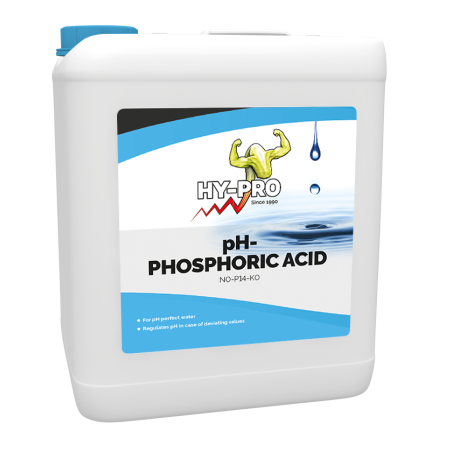



Product can only be collected, cannot be dispatched!
> Please note the safety instructions at the bottom of the page (click here)!
THE POWER OF PH IN PLANT AND SUBSTRATE NUTRITION
The acidity of your substrate and watermix is very important for plants as it determines in large part the absorption rates of nutrients and trace elements.
Hy-Pro PH- (bloom) is made with a phosphoric acid base and helps flowering and fruiting plants by providing extra phosphorus.
THE POWER OF PH IN PLANT AND SUBSTRATE NUTRITION
The essential factors that play a role in determining your substrate pH are water alkalinity, substrate components, fertilizer type, and plant species grown. Knowing all factors involved is the first step in managing the substrate pH. Primarily it is the combination of the alkalinity in the irrigation water and the reaction of the water-soluble fertilizer that affects substrate pH. pH affects nutrient mobility; to prevent pH imbalances, you need to institute a pH-testing to assess substrate pH on a regular basis. A thorough testing of all preplant production inputs, including water source, fertilizer, and greenhouse substrate, is recommended.
HOW DOES PH AFFECT YOUR GREENHOUSE CROPS?
Plants need light, carbon dioxide, water and mineral nutrients in order to produce sugars (food) and grow. Water is supplied through the substrate, and it contains dissolved mineral elements. The mobility of these nutrients is determined by substrate pH. Especially affected are those nutrients that plants require in small quantities, called micronutrients or trace elements. When the pH is too low, the micronutrients become more mobile and are absorbed in excess of what the plant needs, resulting in this potential for toxicities. When the pH is too high, the micronutrients are less mobile and the plant cannot absorb enough, which results in deficiencies.
Your goal as a greenhouse grower is to maintain a stable pH over the life of the crop. This is not an easy task since many factors can affect pH in the growing substrate. The pH can go up or down in a matter of weeks and if you wait for deficiency or toxicity symptoms to develop, you have already compromised the health of the crop and your profits. Each plant species has a preferred pH; in general, the optimal range for maximum growth is 5.2 to 6.2. Plants experience pH through their roots and root hairs experience any changes that occur in this environment, such as variations in moisture, air, or concentrations of solutes in the substrate solution.
Safety WarningSignal word
DANGER |
|||||||
 |
|
||||||
@CUSTOMER_NAME@
@AUTHOR_PROFILE@ @COMMENT_ISO_COUNTRY@@COMMENT_TITLE@
@COMMENT_COMMENT@